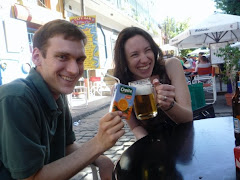This weekend we had our first real chance to venture outside of the immediate environs of our village, on a “cultural trip” that Peace Corps has us make in order to get used to traveling and finding our way around the country. We decided to head for a little town called Abastumani. It’s famous for its hot sulfur baths, which drew the Romanovs here (their palace, still half-burnt, is now a convent), along with droves of tuberculosis patients who came for the baths, the clear mountain air, and the pollen given off from a certain kind of pine cone, which apparently does wonders for the lungs. But the real draw for me was that it’s the home of the Georgian national observatory. I’d spoken with someone working there and arranged to go up on Saturday night if the skies were clear and take a look.
We headed out with Sean, McKinze, and Reid, three trainees in the business development field. Our trip there was a bit longer and more crowded than we would have liked, but it went well, all things considered. We arrived to our newly renovated hotel and wandered around a little while until evening. The rivers are really roaring down off the mountains here, and it can be awe-inspiring just to watch it, especially against the backdrop of the hills.
Some of the bridges are a little less impressive.
Around midnight, we got a taxi up to the observatory. A “Soviet Mercedes,” the driver informed us, as we piled into the decades-old Lada and started the 6.5-kilometer ascent, which somehow consisted entirely of 90-degree angles, on a 2-way road just over a car’s width. Reid managed to take a video that captures some of the route; let’s just say we were all wide awake by the time we got up to the observatory.
We got to go up in the 40 centimeter refractor telescope; it was everything you might dream a telescope dome from 1937 might be. I used to have other career ambitions, but now I want to be the guy who’s up there every night, sitting at the little oak desk, writing in his notebook what he sees.
And what we saw was pretty spectacular – Saturn and its rings, a blue-hot star, and (after some waiting) the moon. It’s a little annoying that the word for “star” in Georgian is “varskvlavi, since, as you’ll notice, the letters r,s,k,v, and l come together without any vowels. This makes it a little hard for us to explain what we did this past weekend in Georgian.
It was incredible, our hosts at the observatory (and an English-speaking Georgian couple from our hotel who came at the same time) were very kind and patient, and that mountain was even more fun on the way down.
The next morning, we decided to ask about a castle that we’d seen perched atop a mountain the day before. At the hotel they told us that it was a 12th-century fortress of Queen Tamar’s. We asked if it was possible to get up there, and suddenly we had a guide: Pele, a worker at the hotel who was born and raised in Abastumani, spoke perfect Russian, and amazingly took us all the way up the mountain. Probably the steepest hike I’ve ever been on, but worth it:
Soviet troops had been quartered at the castle, so there was quite a lot of graffiti, and the castle itself was largely ruined, but looking up at the walls with a strip of meadow between them and the cliff, the mountains rising behind, or coming across some mossy corner as we tripped carefully along a deer track along the mountainside, was really something.
We made it back down just as some huge thunderheads rolled by and somehow missed us. As we went down, Pele pointed out where a bear had lain, told us some history (recent forest fires and old Soviet bases), pointed out the wild raspberry bushes and the best trout streams, and showed us the dust from the supposedly tuberculosis-curing pinecones. On the road back to the hotel, he pointed to an abandoned church. He told us that in Soviet times, they’d turned the church into a bakery (maybe to blacken the paintings and icons). But, Pele told us, some nostalgia in his voice, “They made the best bread.”
When we got back to Kortaneti some hours later, practically the whole village was at the train station; among other departees, our host sister was headed back to Tbilisi. Walking down to the faces that have become familiar, even if the names all haven’t, it really felt like home.
It’s hard to believe that we’re halfway through training now, and that it’s only a month before we move to our permanent site. In just a week and a half we’ll know where we’ll be going. It’s exciting, but it’s hard to think about leaving our host family here in Kortaneti. For now, anyway, it’s enough to enjoy summer coming to the village; the roses are just coming into full bloom, the cucumbers we helped plant from seed are growing right up, and on our run today, there was, amazingly, no mud.






















